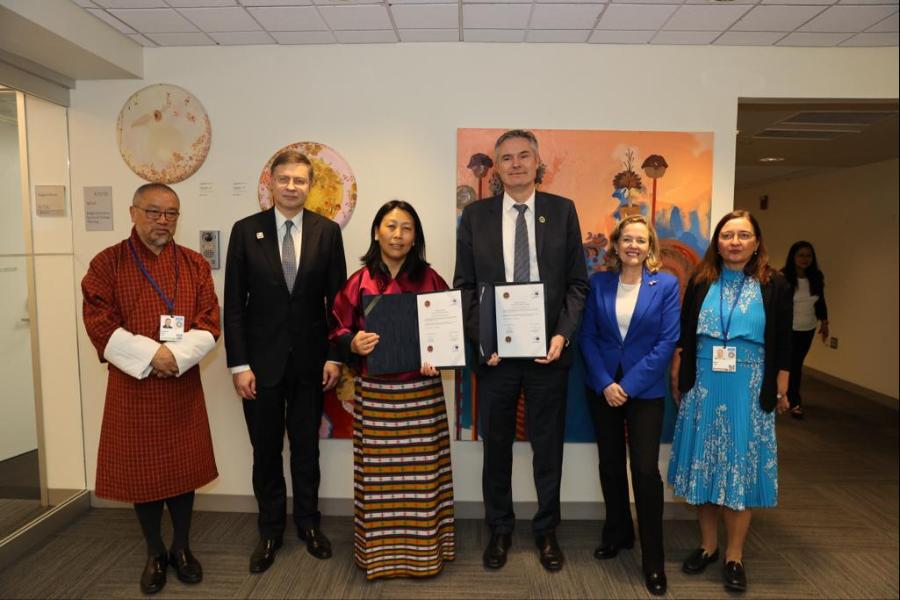
- The first-ever EIB project in Bhutan, one of just three net carbon-negative countries in the world, supports new solar photovoltaic and hydropower schemes under the EU’s Global Gateway initiative.
- The 30-year loan for €150 million will unlock an estimated 310 MW of new renewable energy generation to serve communities in remote regions.
- This expansion of Bhutan’s solar photovoltaic capacity will help overcome hydropower challenges during the dry season.
The European Investment Bank (EIB), the world’s largest multilateral bank and leading global financier of renewable energy, signed its first-ever investment support for Bhutan today.
Bhutan is highly vulnerable to the impact of climate change and is committed to increasing energy access without raising carbon emissions. The thirty-year EIB loan for €150 million will increase renewable energy generation throughout the year and help Bhutan meet its ambitious Nationally Determined Contribution target of constant carbon neutrality.
The financing will back the construction of small to mid-size run-of-river hydropower plants and solar photovoltaic generation to help the Bhutanese government diversify the country’s power mix. The project will allow clean energy to be traded across borders and improve access to green power, supplying thousands of households with reliable and affordable energy, and allowing Bhutan to draw more benefit from its renewable energy resources.
The renewable energy framework loan was signed during the 2024 IMF/World Bank Spring Meetings by Bhutan’s Finance Secretary Leki Wangmo and acting Managing Director of EIB Global Markus Berndt. The signing was attended by EIB President Nadia Calviño.
EIB President Calviño said, “Bringing green, reliable and affordable energy to communities around the world, especially in more remote regions, has huge benefits not just in environmental terms, but also by improving access to health, education and economic activity. That’s why I am delighted that we’ve been able to agree this €150 million investment with our Bhutanese partners, under the EU’s Global Gateway initiative. We’re looking forward to working as a key partner for climate action and sustainable economic development in Bhutan.”
Lyonpo Lekey Dorji, Finance Minister of the Kingdom of Bhutan, stated, “As Bhutan strives to maintain its carbon-negative status amidst rising global challenges, this partnership not only strengthens Bhutan's renewable energy sector, but also contributes to the broader regional and global effort in combating climate change. We welcome the European Investment Bank as our partner in our pursuit of the sustainable development goals and look forward to more collaboration in the future as we take forward our agenda of building a more sustainable planet.”
The new projects, to be implemented by Druk Green Power Corporation, will contribute to climate action, helping Bhutan to strengthen its energy security and increase the use of renewable energy.
The new EIB financing will support the installation of an estimated 310 MW of hydropower and solar power generation capacity. In the first year of operation, the facilities are expected to generate around 670 GWh. Increasing solar power generation will reduce the potential need for energy imports during the dry season, when river flows and hydropower generation capacity are reduced.
This investment in renewable power is part of the EU Global Gateway initiative, which supports projects that improve global and regional connectivity in the digital, climate, transport, health, energy and education sectors.
Bhutan is an environmental leader, and one of only three net carbon-negative countries in the world. It sequesters much more carbon than it emits, thanks to substantial hydropower capacity and the forests that cover 71% of the country.
While hydropower provides a reliable source of growth, other renewable energy technologies, including solar photovoltaic, offer ways to diversify Bhutan’s electricity mix and increase resilience to changing seasonal extreme weather patterns that can adversely affect hydropower supply.
To meet its annual power needs, Bhutan uses solar power alongside hydropower in a complimentary manner. This promotes climate adaptation by diversifying the power generation portfolio, a systemic approach that builds resilience against climate change impacts. Adding new hydropower will increase electricity generation during the dry season and allow Bhutan to exploit its renewable energy generation potential in a way that can also benefit the wider region in the wet season.
Background information
For more information about the EIB Group at the WBG/IMF Spring meetings, visit: The EIB at the 2024 World Bank Group-IMF Spring Meetings.
For interview requests, please reach out to the press contacts below.
The EIB is the long-term lending institution of the European Union. It finances sound investment in pursuit of EU policy goals worldwide. Together with the European Investment Fund, the EIB forms the EIB Group.
EIB Global is the EIB Group’s specialised arm for operations outside the European Union, and a key partner of the EU Global Gateway strategy. It aims to support at least €100 billion of investment by the end of 2027 — around one-third of the overall strategy target. Within Team Europe, EIB Global fosters strong, focused partnerships alongside fellow development finance institutions and civil society. EIB Global brings the EIB Group closer to local communities, companies and institutions through its offices around the world.
About the EIB in Asia
For 25 years, the EIB has supported economic development in Asia and the Pacific. The projects it finances make people’s lives easier — from modernising the rail fleet in Bangladesh, to providing cheaper, cleaner energy to western Nepal. In Asia, the Bank focuses its lending on climate action across all sectors. It also works to include gender equality in the projects it finances, ensuring that women, men, girls and boys benefit from them equally and equitably.

©EIB
Download original

©EIB
Download original

©EIB
Download original

©EIB
Download original

©EIB
Download original